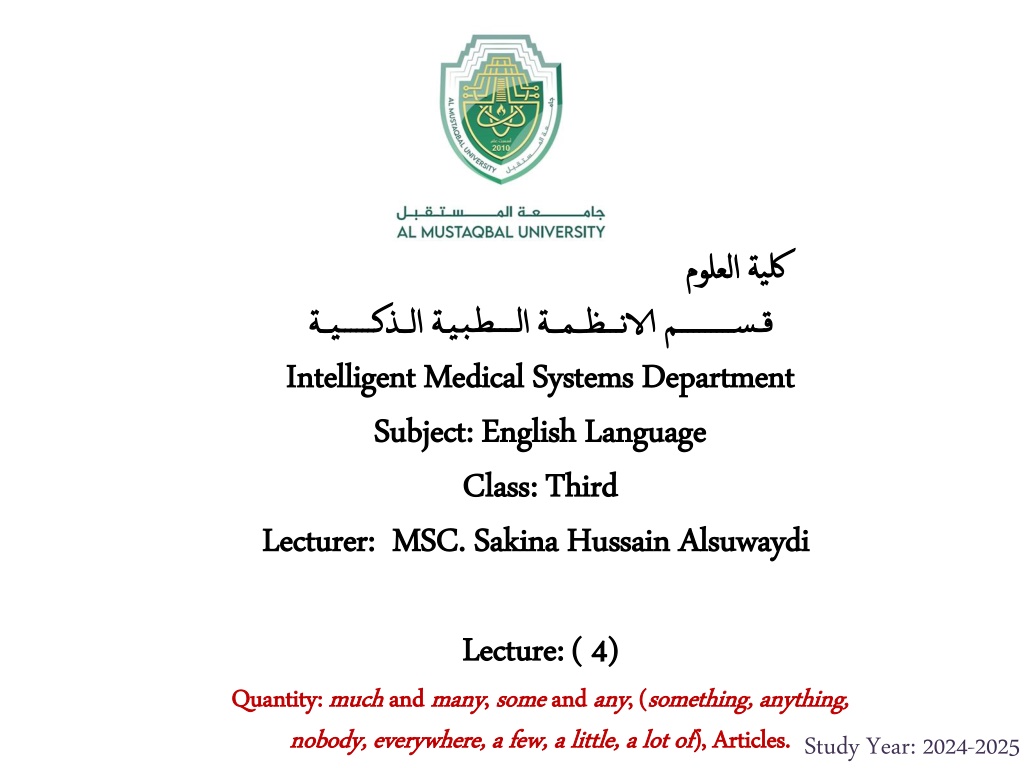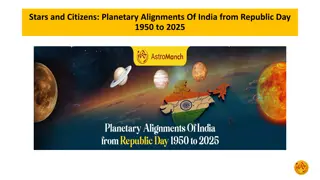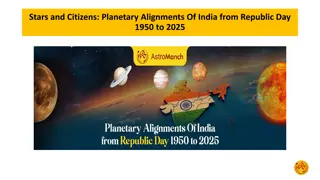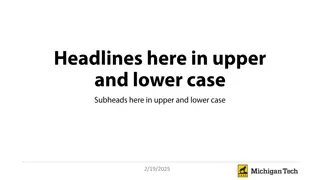
Learn About Quantity Words in English Language Usage
Discover the use of quantity words such as much, many, some, and any in English language to describe amounts of countable and uncountable nouns. Explore rules and examples to understand when to use these words correctly.
Download Presentation

Please find below an Image/Link to download the presentation.
The content on the website is provided AS IS for your information and personal use only. It may not be sold, licensed, or shared on other websites without obtaining consent from the author. If you encounter any issues during the download, it is possible that the publisher has removed the file from their server.
You are allowed to download the files provided on this website for personal or commercial use, subject to the condition that they are used lawfully. All files are the property of their respective owners.
The content on the website is provided AS IS for your information and personal use only. It may not be sold, licensed, or shared on other websites without obtaining consent from the author.
E N D
Presentation Transcript
Intelligent Medical Systems Department Intelligent Medical Systems Department Subject: English Language Subject: English Language Class: Class: Third Lecturer: MSC. Lecturer: MSC. Sakina Sakina Hussain Third Hussain Alsuwaydi Alsuwaydi Lecture: ( Lecture: ( 4 4) ) and many many, , some some and nobody, everywhere, a few, a little, a lot of nobody, everywhere, a few, a little, a lot of), Articles. Quantity: Quantity: much much and and any any, ( , (something, anything, something, anything, ), Articles.Study Year: 2024-2025
Quantity Words Quantity Words What Are Quantity Words? Definition: Quantity words tell us how much or how many of something there is. Key Idea: Some words are used with countable nouns (books, apples, chairs), and others with uncountable nouns (water, sugar, air). We use quantity words to describe amounts (big or small, countable or We use quantity words to describe amounts (big or small, countable or uncountable). uncountable). We use articles ( a , an , the ) to introduce nouns. We use articles ( a , an , the ) to introduce nouns.
Much & Many When to Use Much and Many Rules: - Many is used with countable nouns (things we can count one by one). - Much is used with uncountable nouns (things we cannot count individually). Examples: How many apples do you have? How much water do you drink?
Examples in Context Positive: She has many dresses. (countable) There is a lot of water in the glass. (uncountable, using a lot of instead of much ) Negative: I don t have much free time. (uncountable) There aren t many chairs in the room. (countable) Question: How much coffee do you drink every day? (uncountable) How many pencils are in your bag? (countable)
Practice Exercise Activity: Fill in the blanks with much or many : 1. I don t have _ time. 2. How _ pencils are in your bag?
Some & Any Some and any are both used to talk about an unspecified amount of something, but they are used in different situations. 2. Any Used in negative sentences. Used in questions (except for offers and requests). Used in conditional sentences. Some Used in positive sentences. Used in offers and requests. Examples: I have some oranges. (positive sentence) Would you like some coffee? (offer) Can I have some sugar? (request) Examples: I don t have any oranges. (negative sentence) Do you have any friends? (question) If you have any questions, let me know. (conditional sentence)
Summary table Summary table
Something, anything, nobody, and everywhere are words that refer to indefinite quantities or people and places. Here s how each one works: 1. Something Refers to an unspecified object, idea, or thing. Used in positive sentences and offers or requests. Examples: I want something to eat. (We don t know what it is exactly.) There s something in my eye. (An unspecified object) Would you like something to drink? (Offer)
2. Anything -Refers to any object, thing, or idea, but it is used in negative sentences and questions. -Can be used in positive sentences if the meaning is uncertain or in the sense of no matter what. Examples: I don t have anything to wear. (Negative) Is there anything I can do to help? (Question) I ll eat anything. (Positive, meaning any food)
3. Nobody -Refers to no person or not anyone. -Used in negative sentences to indicate the absence of people. Examples: Nobody was at the party. Nobody knows the answer. 4. Everywhere Refers to all places or in every part. Used to talk about a location or extent. Examples: I ve looked everywhere for my keys. People are talking about this everywhere.
A comparison A comparison
A few, a little, and a lot of are expressions used to describe quantities or amounts of something, but they differ in how much they refer to. 1. A Few Refers to a small number of countable items (things you can count). Generally used with plural countable nouns. Examples: I have a few books. (You can count books: 1, 2, 3 ) There are a few people in the room. (You can count people)
2. A Little -Refers to a small amount of uncountable items (things you cannot count). -Generally used with uncountable nouns (e.g., water, sugar, time). Examples: I have a little money. (Money is uncountable) Can I have a little milk, please? (Milk is uncountable) 3. A Lot Of -Refers to a large amount or a large number of something. -Can be used with both countable and uncountable nouns. Examples: She has a lot of friends. (Friends are countable) We need a lot of time to finish the project. (Time is uncountable)
A comparison A comparison
Articles: A, An, The What Are Articles? Definition: Articles tell us if a noun is specific or general. Types: - A and An (Indefinite articles) - The (Definite article)
A and An Rules: A before consonant sounds (a car, a dog). An before vowel sounds (an apple, an hour). Examples: I saw a cat. She ate an orange. The -Rules: Used for specific things (the sun, the moon, the president). Examples: The sun is bright. The book on the table is mine.
Practice Exercise Fill in the blanks with a , an , or the . - I saw _ cat in the garden. - _____ sun is shining.















